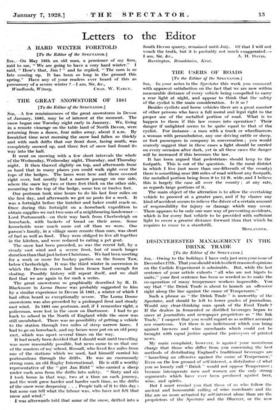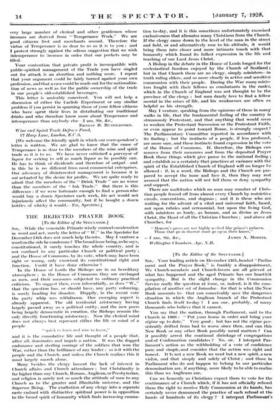DISINTERESTED MANAGEMENT IN THE DRINK TRADE
[To the Editor of the SPECTATOR.] SIR,—Owing to the holidays I have only just seen your issue of December 17th. That you should wish to elicit reasoned opinions on the Carlisle Experiment is admirable. But, while the last sentence of your article exhorts " all who are not bigots to unite," your first sentence has been so worded as to make the co-operation of many temperance workers impossible. You say that " the Drink Trade is about to launch an offensive right along the line against the cause of Temperance."
Such a phrase as " the Drink Trade " is unworthy of the Spectator, and should be left to lower grades of journalism. Would any clear-thinking man speak of the Food Trade ? If the dealers in fermented or distilled beverages began to sneer at journalists and newspaper proprietors as " the Ink Trade," I suspect that you would regard us as neither accurate nor courteous. Yet there is no indictment which you bring against brewers and wine merchants which could not be brought with equal justice against the purveyors of printed news.
My main complaint, however, is against your monstrous charge that those who differ from you concerning the best methods of distributing England's traditional beverages are " launching an offensive against the cause of Temperance." Even on the low ground of self-interest, a distributor of what you so loosely call " Drink would not oppose Temperance ; because intemperate men and women are the only strong arguments which have ever been produced against beer, wine, and spirits.
But I must remind you that those of us who follow the ancient and honourable calling of wine merchants and the like are no more actuated by self-interest alone than are the proprietors of the Spectator and the Observer, or the now very large number of clerical and other gentlemen whose incomes are derived from " Temperance Work." We are good citizens first and merchants second. Therefore the virtue of Temperance is as dear to us as it is to you ; and I protest strongly against the odious suggestion that we wish intemperance to increase in order that our pockets may be
filled. -
Your contention that private profit is incompatible with public-spirited management of the Trade you have singled out for attack is an Asertion and nothing more. I repeat that your argument could be fairly turned against your own profession, and that a case could be made out for the nationaliza- tion of news as well as for the public ownership of the trade in our people's old-established beverages.
This letter is amicably conceived. You will not help a discussion of either the Carlisle Experiment or any similar problem if you persist in spurning those of your fellow citizens who have spent their lives in distributing our traditional drinks and who therefore know more about Temperance and intemperance than anybody else-4 am, Sir, &c.,
17 Harp Lane, London, E.C.3.
[We welcome the friendly spirit in which our correspondent's letter is written. We are glad to know that the cause of Temperance is as dear to the members of the wine and spirit trade as it is to us. We have never criticized a purveyor of liquor for seeking to sell as much liquor as he possibly can. He has to think of dividends and therefore of output--and in this he is no different from Most commercial enterprises. Our advocacy of disinterested management is because it is not actuated by the desire for profits. We are quite ready to admit that the members of the " Drink Trade " are no worse than the members of the Ink Trade." But there is this difference : if we were fortunate enough to find a person who would buy a dozen Spectators each week, his act would not injuriously affect the community, but if he bought a dozen bottles of whisky it would.--ED, Spectator.]







































 Previous page
Previous page